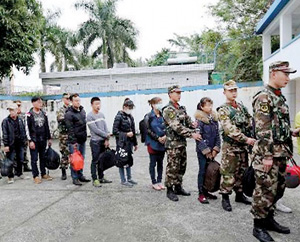Sunday Times 2
Pakistani ‘tiger’ in police net for smuggling South Asians into HK
View(s):The Pakistani mastermind of a human smuggling syndicate was arrested in an operation involving police in China and Hong Kong, authorities announced this week.

Police say operation against illegal immigrants and human smuggling syndicates will continue. Pic courtesy South China Morning Post
Law enforcement agencies announced that the Pakistani was known by his nickname, ‘Lofu Chai’, or ‘little tiger’. He had links to Hong Kong and was named as the kingpin of one criminal syndicate charging thousands of HK dollars to arrange illegal entry into Hong Kong for Pakistanis and others.
The Pakistani and his gang charged HK$8,000 per person, police revealed. That is the equivalent of 108,000 Pakistani rupees, or slightly more than US$1,000 (Rs 146,675). As they announced the arrest of the Pakistani kingpin, police also said they detained 142 important figures from three syndicates involved in smuggling people into China and then on to Hong Kong.
Police from the southern Chinese province of Guangdong, as well as Guangxi and Yunnan provinces said they arrested 2,943 suspected illegal immigrants in three major operations. Among those held were 83 South Asians, including Indians, Bangladeshis and Pakistanis.
The majority detained were Southeast Asians such as Vietnamese. Most Pakistanis, Indians and Bangladeshis are smuggled into Hong Kong in speedboats from the southern Chinese city, Shenzhen, a notorious center for crime, the illegal sex trade, and the counterfeit mafia, while also known as an industrial city.
Sri Lankan politicians have praised Shenzhen as a model worthy of emulation in the island. Many Indians, Pakistanis and Bangladeshis, who get caught in Hong Kong after sneaking into the city illegally, file for asylum to prevent deportation and prosecution. When their asylum application is rejected after review, they then apply for protection under UN laws against torture.
Thousands of Pakistani, Indian and Bangladeshi immigrants come to the city mainly in search of work – menial or otherwise.
Many are seen roaming the streets, and idling on street corners wearing sarongs and slippers in the popular tourist town Tsim Sha Tsui peddling narcotics day and night, counterfeit watches and luxury goods, dodgy suits from Sindhi tailors, lodging in filthy guest houses, and offering meals in unsanitary curry joints. There are even Indian and Bangladeshi sex workers loitering on streets, smoking and drinking in public.
The impression they create tarnishes all South Asians including Sri Lankans. Locals and visitors frown on them and avoid eye contact. Locals privately complain of the red betel chew stains on the streets of Tsim Sha Tsui, on walls of buildings, and even on the walls of stairways leading into the subway train. In Hong Kong, asylum applicants are prohibited from working.
The Secretary for Security, Lai Tung-kwok, told Hong Kong lawmakers recently that 232 asylum seekers (South Asians and Vietnamese) were arrested in 2015, compared with 166 the year before.
Amid a flood of dubious asylum-seekers from India, in particular, as well as from Bangladesh and Pakistan, Hong Kong is now considering increasing the jail terms for human smugglers. In mid-February, police arrested 45 South Asians for illegally entering Hong Kong just after they had landed on Hong Kong’s shores. Days before that, in an embarrassing episode for the Immigration Department, two young Indians, aged 27 and 35, fled into Hong Kong from a China-bound train after they were denied entry at a main terminal. They bolted from the train just before the doors closed.
Operations aganinst illegal immigrants and human smuggling syndicates will continue for some time to come in China and Hong Kong. Yin Chengjun, the head of the Border Control Department of China’s National Ministry of Public Security, was cited as saying this week that people smugglers in Hong Kong were operating with gangs in South Asian and Southeast Asian countries. They help smuggle immigrants to southern Guangdong Province and then through to Hong Kong.
In early March, a boatload of 14 Pakistanis, including two women, as well as seven men from India and Bangladesh was seized by police in the waters off Hong Kong International Airport.
Among them was a three-year-old Pakistani girl.
In all, the wooden boat carried 22 people and was seized in the early hours on a foggy day. A suspected smuggler, a Chinese, who steered the boat was also detained.

